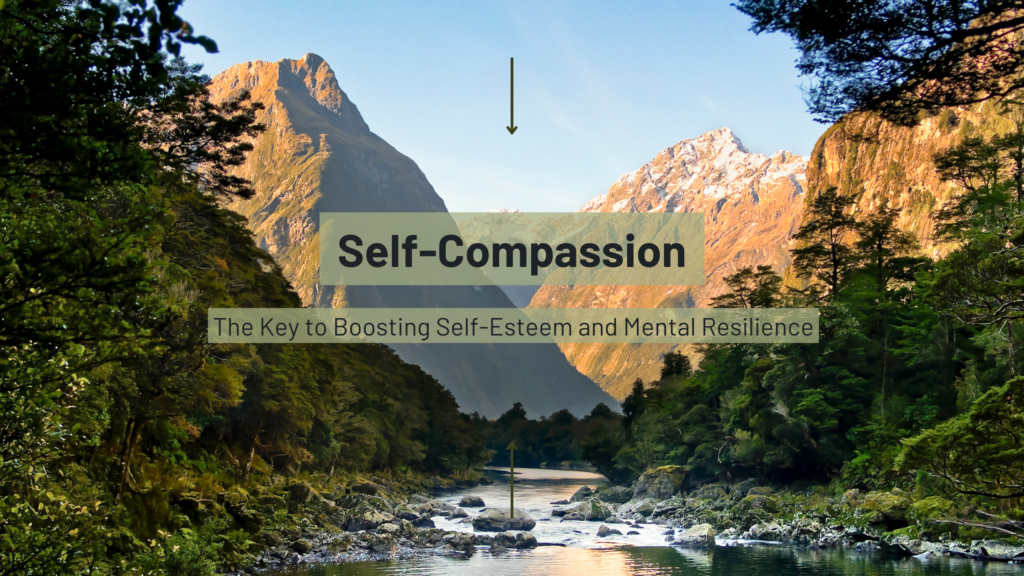
In our fast-paced, achievement-oriented world, it’s all too common to be your own harshest critic. We often set impossibly high standards for ourselves and beat ourselves up when we don’t meet them. This negative self-talk can erode self-esteem and leave us feeling mentally fragile. But what if there was a way to change this narrative? Enter self-compassion, a powerful tool that can transform the way you perceive yourself and navigate life’s challenges.
Understanding Self-Compassion
Self-compassion, as defined by psychologist Kristin Neff, involves three key components:
- Self-Kindness: Treating yourself with the same kindness and understanding that you would offer to a friend in times of suffering.
- Common Humanity: Recognizing that suffering and imperfection are part of the shared human experience. You’re not alone in your struggles.
- Mindfulness: Maintaining a balanced awareness of your thoughts and feelings without judgment. This involves taking a non-critical stance towards yourself.
The Benefits of Self-Compassion
Research has shown that self-compassion can have a profound impact on mental health. It’s associated with lower levels of anxiety, depression, and stress. When you practice self-compassion, you create a buffer against the harsh effects of self-criticism and failure. Instead of dwelling on your mistakes, you respond to them with understanding and forgiveness.
Self-compassion also improves emotional resilience. When faced with adversity, self-compassionate individuals are more likely to bounce back and continue pursuing their goals. They view setbacks as opportunities for growth rather than as personal flaws.
The Link Between Self-Compassion and Self-Esteem
While self-esteem and self-compassion are related, they operate differently. Self-esteem often depends on external validation, such as achievements, praise, and comparisons to others. This can be a precarious foundation because it’s vulnerable to criticism and failure.
Self-compassion, on the other hand, is an internal source of self-worth. It doesn’t rely on external factors. When you practice self-compassion, you embrace your imperfections and failures as part of being human, leading to a more stable and resilient sense of self-worth.
Strategies for Practicing Self-Compassion
Now that we understand the importance of self-compassion, let’s explore practical strategies for cultivating it:
- Mindful Self-Compassion Meditation: Guided meditations can help you develop self-compassion by focusing on self-kindness, common humanity, and mindfulness.
- Positive Self-Talk: Replace self-criticism with self-encouragement. When you make a mistake, talk to yourself as you would to a friend. Offer words of comfort and understanding.
- Self-Compassion Journaling: Keep a journal where you write about your struggles and failures with a self-compassionate perspective. Acknowledge your emotions and offer yourself kindness.
- Self-Compassion Affirmations: Create and repeat positive affirmations that emphasize self-kindness, common humanity, and mindfulness.
- Seek Professional Guidance: If you find it challenging to practice self-compassion on your own, consider working with a therapist or counselor who specializes in self-compassion techniques.
Overcoming Common Barriers
While the benefits of self-compassion are clear, many individuals face common barriers when trying to practice it:
- Inner Critic: The inner critic can be relentless. Recognize when it’s active and gently redirect your thoughts toward self-compassion.
- Fear of Self-Indulgence: Some people worry that self-compassion is selfish or indulgent. It’s important to understand that self-compassion is about self-care, not self-pity.
- Perfectionism: Perfectionists often struggle with self-compassion because they set unrealistically high standards. Start by acknowledging that perfection is unattainable and embrace your imperfections.
Real-Life Success Stories
To illustrate the power of self-compassion, let’s look at some real-life success stories:
- Sarah, a high-achieving executive, learned to practice self-compassion after facing burnout. She found that it not only improved her mental health but also made her a more effective leader.
- Mark, a college student struggling with academic pressure, discovered self-compassion techniques that helped him manage stress and maintain a healthy work-life balance.
These stories demonstrate that anyone can benefit from self-compassion, regardless of their background or circumstances.
Cultivating Self-Compassion as a Lifelong Journey
It’s important to understand that self-compassion is a skill that develops over time. It’s a lifelong journey of self-discovery and self-acceptance. As you incorporate self-compassion into your daily life, you’ll likely notice improvements in your self-esteem and mental resilience.
In a world that often emphasizes achievement and perfection, self-compassion offers a refreshing alternative. It’s a powerful tool for boosting self-esteem and mental resilience, helping you navigate life’s challenges with greater ease and self-acceptance. Start your journey toward self-compassion today and watch how it transforms your relationship with yourself and the world around you.
Ready to explore the transformative power of self-compassion? We offer free consultations to help you get started on your journey towards greater self-compassion, self-esteem, and mental resilience.
Call for a Free Consultation: 559.816.4781
